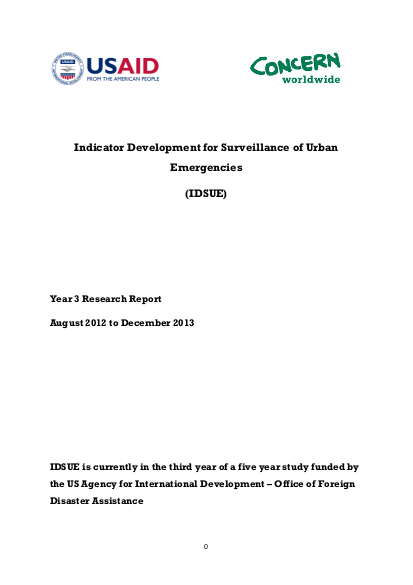Year 3 Research Report August 2012 to December 2013

Assessing urban emergencies/crisis and finding effective means of responding to these emergencies has become a major interest and focus for many humanitarian actors given the current rates of urbanization worldwide. Concern is currently undertaking large-scale routine data collection in informal settlements (slums) of Nairobi and other major urban areas in Kenya. The study, now in its third year, has resulted in the collection of baseline household information on WASH, food security, personal security, livelihoods, morbidity, and coping strategies in five informal settlements over eight rounds. This report will summarize findings from our third year in operation, August 2012 to December 2013, which reveals that several domains have the potential to be key indicators of urban crisis onset. These domains, such as income, food security indices, MUAC, personal security/shocks, and the use of coping strategies, show major variation across areas, time, and within communities.
Resource collections
- Evaluating humanitarian action
- Monitoring and Evaluation (M&E)
- Monitoring of humanitarian action
- Topics
- UN Habitat - Urban Response Collection
- Urban Response - Urban Crisis Preparedness and Risk Reduction
- Urban Response Collection - Community Engagement and Social Cohesion
- Urban Response Collection - Economic Recovery
- Urban Response Collection - Environment and Climate Change
- Urban Response Collection - Housing, Land and Property
- Urban Response Collection - Urban Crisis Response, Recovery and Reconstruction
- Urban Response Collection - Urban Resilience
- Use of evaluation evidence
